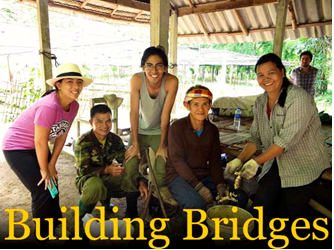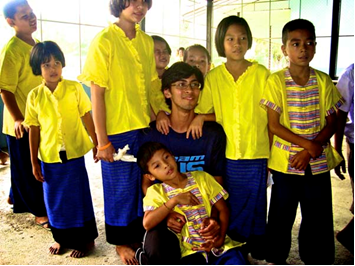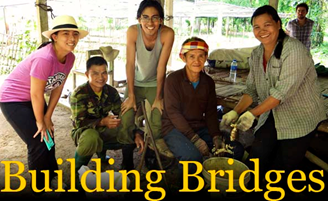 Building Bridges
Building Bridges
By Mubin Shah Ramazan, National University of Singapore, Intern 2011
I spent my summer vacation in the Bridges Across Borders Southeast Asia Community Legal Education Initiative (BABSEACLE) 2011 International Legal Studies Internship Program.
The internship program spanned a period of 12 weeks. During the first two weeks, I attended seminars and workshops with other international interns from America, Canada, Australia and France in Chiang Mai, Thailand. We grappled with many legal issues during these workshops, such as the plight of HIV patients in Thailand, the sex trade industry and the rights of transgender individuals.
The presence of students from all over the world added new and interesting perspectives to the discussion. Furthermore, as the only Singaporean in the Internship Program, I found myself often roped in to share my ‘Asian’ perspective.
Village Life
Next, the interns were placed at different locations for a one-week immersion program. The aim of the immersion was to give us a first-hand experience of the lives of Thai families who live in poverty, and who find it difficult to access legal aid.
Five other interns and I spent a week in King’s Project, Huai Lan, Thailand – a protected area encompassing a reservoir and nature reserve. While I was there, we helped the villagers plant trees and pick berries – and build a small dam!
In the afternoons, we taught English at a village school. This was one of the most fulfilling experiences I had during the internship. The students in the school were extremely excited to see us every day and were so eager to learn. During our week there, we taught them simple English words and phrases; and played many games with them. Often, our sessions would run over the allocated time and we had to ‘force’ the students to go home. I was sad to leave them, and extremely touched when the students presented us with hand-made cards as parting gifts.
The Legal Work Begins
After our three weeks in Chiang Mai, the interns were despatched to the various BABSEACLE regional offices. The real legal work had begun. I spent the next nine weeks in Hanoi, Viet Nam, with two other interns from America and Australia.
As soon as we arrived, we immediately began working on a funding proposal to the United Nations Development Program (UNDP) to secure funds for BABSEACLE to continue its work in Southeast Asia. This involved going through and collating spreadsheets of data, editing the funding proposal and discussing strategies and work plans for future workshops, seminars and setting up law clinics in Vietnamese universities.
We also got to work with Dr Chris Walsh, from the Open University in England, to write a research paper on the need for community legal education in Viet Nam and the importance of law clinics in the universities to improve the quality of legal education in Viet Nam. My task was to research on the development of legal education in Viet Nam.
During the internship, I also had the opportunity to travel to different parts of the country to help facilitate the workshops and seminars that BABSEACLE conducts. I visited Hue University and it was definitely an eye-opening experience to compare the facilities at Hue with those of the National University of Singapore. However, I was very much impressed by the eagerness of the Hue law students who attended the workshop. They had just finished their examinations and the holidays were about to begin, but they all turned up punctually and participated actively during the workshop.
Another major component of the internship was researching and writing topics for two manuals that BABSEACLE was producing for Vietnamese universities – one on community legal education and another on clinical legal education. In total, I researched and worked on seven topics, including children’s rights in Viet Nam, establishing partnerships with the community and time management skills.
Initially, I was afraid that I would not have enough time to research each topic thoroughly. Furthermore, as a Singaporean, I would definitely not be able to understand the Vietnamese laws as well as the professors who taught in the universities; yet these manuals were meant for these very same professors. However, through working closely with Vietnamese students and lawyers throughout the entire period, we managed to put together the first draft of the manual in eight weeks.
Turnabout – Teaching Law Students
Lastly, throughout the internship program, we taught English to law students from the Trade Union University in Hanoi. This was very different from when I was teaching the children in King’s Project in Thailand. It was challenging to develop lesson plans for the law students. We had to think outside the box to prepare lessons that would help improve their English, but at the same time stimulate intelligent discussion. We did not want our lessons to be one-sided; we wanted to learn from the students as well.
To that end, we discussed the different legal systems in the world and managed to have a discussion on international law and the International Court of Justice (ICJ). We did a case study on Singapore and Malaysia’s resolution of Pedra Branca through the ICJ and discussed if the ICJ would be a feasible peaceful form of settlement for the conflict between Viet Nam and China over the Spratly Islands.
Broadening Horizons
My summer internship with BABSEACLE has been without a doubt one of the best experiences of my life. The internship allowed me to interact with law students from all over the world and also work closely with the legal fraternity of our Southeast Asian neighbour, Viet Nam. It helped me understand how a non-profit organisation runs and gave me a first-hand insight on international legal work. I was exposed to many different kinds of work and this has made me realise that there are many different options available to me upon completing my law degree.
This legal internship would not have been possible without the generous grant provided by the Class of ’84. As the internship lasted 12 weeks in total and required considerable expenditure for travelling from one country to another, the cost of the internship would have been a deterrent for me as it was quite expensive. The grant allowed me to take part in the program without having to worry about the financial burden the internship would have caused for my family, had I have had to pay the full amount for the program. Thanks to the Class of ’84, I experienced possibly the best and most fulfilling summer internship ever.
Thanks to NUS who initially published this article http://www.nuslawlink.com/2011-sep-students

